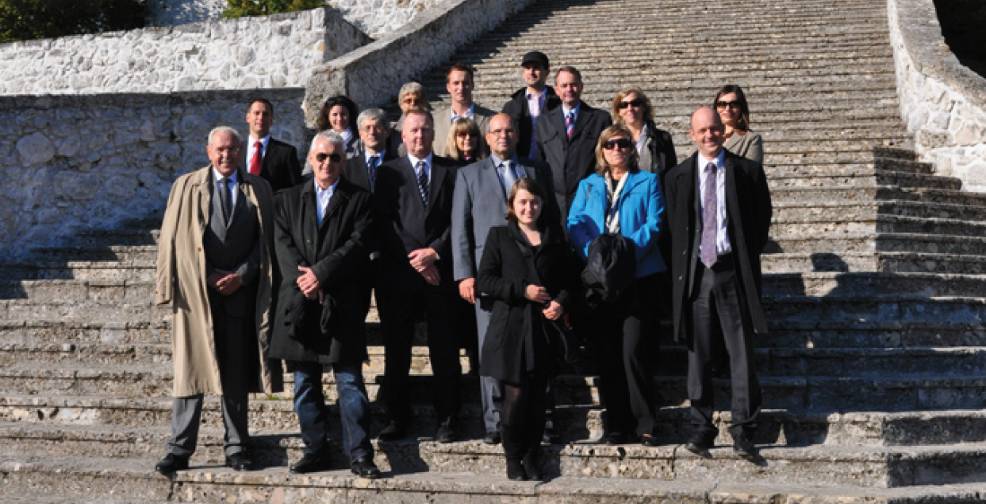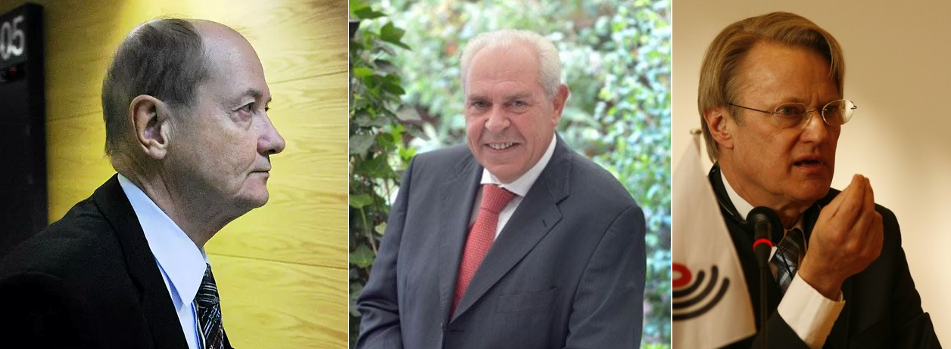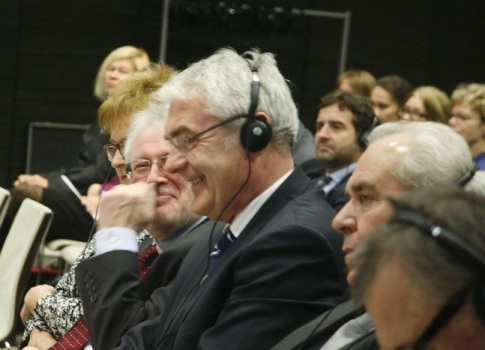

Group photo of the annual meeting of Visegrád IPOs and "friends" including Friedrich Rödler from Austria (front row, left) and Željko Topić from Croatia (front row, second from left). Location: Bled, Slovenia, October 2011.
The overall impression of the Administrative Council during the Battistelli era is that of a body dominated by an ad hoc "crony network" of self-serving officials who managed to steer the organisation and its executive branch, the European Patent Office, into very perilous waters.
"Another example of an Administrative Council delegate with an inflated sense of self-entitlement was Friedrich Rödler, who served as Director-General of the Austrian Patent Office between 2005 and 2015."Enäjärvi was the former head of the Finnish Patent and Registration Office who was forced to retire in June 2010 and was subsequently convicted on charges related to the misuse of his official credit card in December 2011.
Another example of an Administrative Council delegate with an inflated sense of self-entitlement was Friedrich Rödler, who served as Director-General of the Austrian Patent Office between 2005 and 2015.
In addition to his generous remuneration as Director-General, Rödler received an additional salary for a period of eight years between 2005 and 2013. He received this second salary in his capacity as the managing director of serv.ip, a partially autonomous unit of the Austrian Patent Office, under an arrangement whose illegality was confirmed by the Austrian Supreme Court in 2016. To this day it remains unclear whether or not the Austrian state managed to reclaim the public funds which Rödler misappropriated in this manner.
Rödler was more fortunate than his Finnish counterpart Enäjärvi because he managed to avoid the ignominy of a criminal sanction for his "double-dipping" behaviour.
Also worthy of mention here is the former head of the Danish delegation, Jesper Kongstad.
During his seven-year stint as Chairman of the EPO Administrative Council - between July 2010 and September 2017 - Kongstad was rumoured to have been in receipt of a tax-free "top-up" salary. According to reliable inside sources, Kongstad's "second salary" was paid to him by the Human Resources Department of the EPO as part of a secret pact concluded with Battistelli in 2010.
In October 2016, it was reported that Kongstad had been reported to the national tax authorities in Denmark in connection with the “hush money” he was rumoured to receive from Team Battistelli.
Like Rödler, Kongstad was fortunate enough to avoid judicial sanction for the misconduct of which he was suspected. He was simply put out to grass as discreetly as possible by the Danish government in 2017.

Public service or self-service ? Some of the Administrative Council's most prominent "double-dippers".
From l. to r.: Martti Enäjärvi (FI), Friederich Rödler (AT) and Jesper Kongstad (DK).
"In their home countries, the excesses of such individuals are usually curtailed by regulatory and corrective mechanisms – in other words the typical systems of checks and balances that exist in states where the rule of law is respected and enforced."As an ultima ratio, there are criminal law enforcement agencies and courts of law which can impose judicial sanctions in cases of proven misconduct.
Of course the corrective mechanisms that exist at a national level do not always work as intended. Indeed, they are often less rigorous and effective than one might hope at detecting and deterring such misconduct. This is particularly so in the case of states which lack mature rule-of-law traditions, such as those which emerged in Eastern European following the fall of the Soviet Union.
A good example of such regulatory failure is provided by the case of Željko Topić which will be familiar to readers of Techrights.
Topić originally hails from Banja Luka in the Bosnian Republika Srpska zone of Bosnia and Herzegovina. In the early 1990s he moved to Zagreb in Croatia where he managed to carve out a career for himself as a purported "IP doyen" in the Balkan region.
Despite its “captured state” reputation, Croatia was permitted to join the EPO in 2008. It also managed to qualify for EU membership in July 2013 but since then it has been reported as “backsliding” on corruption.
During his tenure as director of the Croatian State Institute for Intellectual Property, Topić was accused of numerous abuses. However, due to the dysfunctional justice system in his home country, together with the political protection which he received from the Croatian President Ivo Josipović, Topić was never properly held to account for his alleged misdeeds.

Željko Topić in Tallinn (March 2012) flanked by his "good brothers", Miklos Bendzsel (l.) from Hungary and Friedrich Rödler (r.) from Austria.
epo.org link)
"According to EPO insiders, when some Council delegates had the temerity to question Topić's suitability for the post during the selection procedure in March 2012, Battistelli threw a hissy-fit and threatened to resign if "his" candidate was not appointed."The majority of the Council delegates capitulated to Battistelli's demands and the rest, as they say, is history.
Topić departed from the EPO in December 2018 and returned to Zagreb where he now masquerades as a “European Patent Attorney” despite never having acquired the necessary professional qualification.
Topić's case is rather exceptional and it seems to be a result of the particular political circumstances that prevail in Croatia and other "captured states".
In more mature democratic polities where the rule of law is respected, the existing checks and balances normally function in a sufficiently effective manner to rein in the excesses of such "rogue" officials and prevent them from spiralling too far out of control.
As we shall see in the next part, things are significantly different in the legal no-man's land where international organisations like the EPO operate. ⬆